L-Theanine and GABA: Natural Calm for Parkinson’s-Related Anxiety
Introduction
Anxiety is one of the most common and distressing non-motor symptoms of Parkinson’s disease. It can appear suddenly, sometimes unrelated to external events, and often intensifies during “off” medication periods when dopamine levels drop. For many, this anxiety feels less like worry and more like a physiological surge — a racing heart, tense muscles, trembling, or breathlessness that arrives without reason and leaves exhaustion behind.
While medications help regulate motor control, anxiety often remains a stubborn companion. It affects sleep, focus, digestion, and even how well Parkinson’s medications work. Because stress hormones like cortisol can worsen dopamine imbalance, calming the nervous system becomes an essential part of comprehensive Parkinson’s care.
Two natural compounds — L-theanine and GABA (gamma-aminobutyric acid) — have gained growing attention for their ability to quiet the mind and balance the body’s stress response gently but effectively. Unlike sedatives, they promote relaxation without drowsiness, supporting calm alertness and emotional resilience.
In this article, we’ll explore how L-theanine and GABA influence brain chemistry, why they may be especially helpful for Parkinson’s-related anxiety, and how they can be safely integrated into a holistic wellness plan. 🌙
Looking for supplements for This? Click here.
🧠 Understanding Anxiety in Parkinson’s

Parkinson’s disease is typically defined by its motor symptoms — tremor, rigidity, and slowness — yet the emotional dimension can be equally challenging. Anxiety, depression, and panic are common companions. Studies suggest that up to 40–50% of people with Parkinson’s experience anxiety disorders at some point, often even before motor symptoms appear.
The origins of this anxiety are both neurological and biochemical. Dopamine, serotonin, and GABA — the neurotransmitters responsible for motivation, joy, and calm — become dysregulated as dopamine-producing neurons degenerate. This disrupts the brain’s delicate balance between stimulation and inhibition, leaving the nervous system prone to hyperarousal.
Compounding this, the autonomic nervous system (which regulates heart rate, digestion, and breathing) becomes less adaptable. Stressful situations or even minor daily changes can trigger exaggerated physiological responses — sweating, heart palpitations, muscle tension, or panic.
Over time, this heightened stress reactivity drains emotional and physical energy, creating a feedback loop: the more anxious one feels, the more symptoms worsen, and the more anxiety returns.
This is where compounds like L-theanine and GABA can help — not by numbing emotion, but by restoring equilibrium within the nervous system.
🍃 What Is L-Theanine?
L-theanine is an amino acid found almost exclusively in green tea leaves (Camellia sinensis). It’s the compound responsible for the tea’s subtle calming effect — the reason why sipping tea soothes the mind without making you sleepy.
Chemically similar to glutamate (an excitatory neurotransmitter), L-theanine can cross the blood-brain barrier and gently modulate brainwave activity. It increases alpha waves — the same relaxed but alert pattern seen during meditation or deep focus — and supports neurotransmitters like dopamine, serotonin, and GABA.
Unlike caffeine, which stimulates the nervous system, L-theanine promotes calm concentration. In fact, studies show that when combined with caffeine (as naturally occurs in tea), L-theanine smooths out the jittery effects of stimulation while preserving mental clarity.
This ability to relax without sedation makes L-theanine particularly valuable for people with Parkinson’s, where maintaining alertness while reducing tension is key.
💫 How L-Theanine Calms the Brain
The brain’s stress response depends on a constant dialogue between excitatory and inhibitory signals. When stress hormones or overactive neural circuits dominate, this balance tilts toward hyperexcitability — resulting in anxiety, restlessness, or sleep disturbance.
L-theanine works by gently restoring this equilibrium. It binds to glutamate receptors in the brain, moderating their activity and preventing overstimulation. It also increases GABA production — the brain’s primary inhibitory neurotransmitter — while enhancing serotonin and dopamine levels.
This multi-pathway effect creates a smooth, steady calm rather than the heavy sedation produced by some anti-anxiety drugs. In EEG studies, L-theanine increases alpha brainwave activity, which correlates with feelings of peaceful alertness.
In simpler terms, L-theanine helps the brain switch gears from “fight or flight” to “rest and digest” — the same state activated during meditation or relaxation breathing.
For someone with Parkinson’s, whose nervous system is often overstimulated and fatigued, this gentle modulation can feel like pressing a biological “pause” button. 🌿
🌈 GABA: The Body’s Natural Tranquilizer
While L-theanine helps increase GABA levels, GABA itself plays an even more fundamental role in emotional stability.
GABA, short for gamma-aminobutyric acid, is the main inhibitory neurotransmitter in the brain — the chemical that tells neurons to slow down. It’s the body’s built-in tranquilizer, counterbalancing excitatory messengers like glutamate.
In a healthy brain, GABA maintains harmony between activity and rest. But in Parkinson’s, this balance can be disrupted. Studies show altered GABAergic signaling in brain regions responsible for both movement and emotion. This contributes not only to tremors and rigidity but also to heightened anxiety, insomnia, and even panic attacks.
Low GABA activity leaves the brain vulnerable to overstimulation — like an orchestra playing without a conductor. The result is an anxious, tense, and restless mind.
By replenishing or enhancing GABA signaling, it’s possible to reestablish that missing rhythm — helping neurons communicate in a more measured, harmonious way.
🌿 L-Theanine and GABA: A Synergistic Duo
L-theanine and GABA complement each other beautifully. While L-theanine promotes the brain’s natural GABA production and receptor sensitivity, supplemental GABA can directly provide inhibitory support to calm the nervous system.
Together, they form a biochemical “calm circuit.” L-theanine enters the brain, reduces excitatory glutamate activity, and boosts GABA and dopamine. GABA, meanwhile, enhances this calming network, lowering muscle tension, improving sleep, and reducing the racing thoughts that accompany anxiety.
Research supports this synergy. In one clinical study, L-theanine increased alpha brainwave activity within 30–40 minutes of ingestion, improving relaxation and focus. Another study found that combining GABA and L-theanine enhanced stress resilience and reduced cortisol response more effectively than either alone.
This gentle duo works best when used consistently. Over time, it helps the brain “unlearn” its hypervigilant state — retraining the nervous system to remain calm even in stressful moments.
Looking for supplements for This? Click here.
💬 Why Parkinson’s Patients May Benefit Most
Parkinson’s-related anxiety is complex. It often arises not from external fears but from internal neurochemical shifts. “Off” periods — when dopamine levels temporarily drop before the next medication dose — can trigger surges of panic or restlessness seemingly out of nowhere.
At the same time, the sympathetic nervous system becomes hypersensitive, amplifying physical responses to minor stressors. L-theanine and GABA can help buffer this reactivity by modulating the very neurotransmitters involved in these fluctuations.
L-theanine’s ability to enhance dopamine also supports emotional stability during “off” phases. By promoting balanced neurotransmission, it can soften both mental and motor tension. GABA’s inhibitory tone helps prevent the overfiring that leads to tremor and anxiety spikes.
Because both compounds are non-sedating, they allow the nervous system to unwind without dulling awareness — a key advantage over many anxiolytic medications.
Over time, this combination can restore a more natural calm, reducing not just the intensity of anxiety but its frequency. 🌸
🌿 Scientific Evidence and Human Studies
Clinical research on L-theanine and GABA has expanded significantly over the past two decades.
A 2019 review in Frontiers in Nutrition concluded that L-theanine significantly reduces stress and anxiety levels in people exposed to psychological challenges. Participants reported improved focus, lower tension, and better sleep quality.
EEG studies confirmed that L-theanine increases alpha brainwaves — associated with relaxed concentration — without inducing drowsiness. This makes it ideal for those who wish to feel calm but still alert during the day.
GABA supplementation, while once controversial because of questions about absorption, has also shown measurable effects. Modern formulations, including liposomal and fermented GABA, appear capable of crossing the blood-brain barrier and influencing brain activity directly.
In human trials, GABA supplementation lowered heart rate and stress markers in participants facing acute anxiety tasks. Subjects described feeling “centered” and “clear-minded,” not sedated.
For Parkinson’s patients, these effects may translate into fewer anxiety-triggered motor symptoms, more consistent sleep, and smoother medication responses.
🌙 Supporting Sleep and Nighttime Calm
Sleep disturbances are another area where L-theanine and GABA shine. Many people with Parkinson’s struggle with insomnia, early awakenings, or fragmented rest — often worsened by nighttime anxiety or medication effects.
L-theanine helps prepare the brain for rest by promoting alpha and theta brainwaves, the same frequencies active during early sleep stages. It also increases GABA and serotonin, helping ease the transition into deeper, restorative sleep.
GABA, meanwhile, directly quiets neural firing and muscle tension. Supplementing before bedtime can reduce sleep onset latency — the time it takes to fall asleep — and improve overall sleep quality.
Together, they act as natural sleep facilitators, supporting rest without dependency or next-day grogginess. Better sleep then reinforces emotional stability and reduces daytime fatigue, creating a positive cycle of renewal. 🌛
🌼 Cognitive Clarity and Emotional Resilience
Unlike sedatives or tranquilizers, L-theanine and GABA don’t dull mental function. On the contrary, many users describe clearer thinking, improved concentration, and an easier time staying present.
This mental clarity is rooted in L-theanine’s effect on alpha brainwaves, which foster calm attention — the same state cultivated through mindfulness meditation. For Parkinson’s patients who experience cognitive fatigue or emotional reactivity, this calm alertness can be profoundly grounding.
GABA supports this balance by toning down excess excitatory signals without impairing alertness. Together, they build emotional resilience — the ability to stay centered even as symptoms fluctuate.
That resilience is not just psychological. It’s biochemical: a nervous system that has relearned how to stay balanced under pressure.
🌱 How to Use L-Theanine and GABA Safely
L-theanine and GABA are available as dietary supplements, often in capsule or powder form. L-theanine is commonly dosed between 100–400 mg per day, while GABA ranges from 250–750 mg depending on individual response.
For daytime anxiety, taking L-theanine once or twice daily (morning and afternoon) may help maintain steady calm. For evening relaxation and sleep, combining L-theanine with a lower dose of GABA can enhance restfulness.
Because L-theanine is non-habit-forming and doesn’t interfere with most medications, it’s considered very safe. Still, anyone taking sedatives, antihypertensives, or psychiatric medications should consult a healthcare provider before starting.
Similarly, while GABA is generally well-tolerated, high doses may cause mild drowsiness or tingling sensations. Start low and increase gradually under guidance.
The key to success lies in consistency — allowing time for the nervous system to adapt and reestablish calm. Over several weeks, many users notice deeper relaxation, smoother mood transitions, and reduced anxiety spikes.
🌾 Synergy with Parkinson’s Care
Both L-theanine and GABA can be seamlessly integrated into existing Parkinson’s treatment plans. They complement, rather than compete with, dopamine-based therapies.
Their effects on stress reduction can actually improve the body’s response to levodopa by lowering cortisol, stabilizing blood pressure, and supporting digestive absorption — factors that influence medication efficacy.
They also align beautifully with non-pharmacological approaches such as mindfulness, exercise, and therapy. The brain becomes more receptive to cognitive and emotional retraining when its stress chemistry is balanced.
For example, combining L-theanine with deep breathing or meditation amplifies alpha-wave activity. Taking GABA before bedtime enhances relaxation during restorative sleep stages.
These synergistic effects make natural calmants like L-theanine and GABA valuable allies in comprehensive neurological care — not as replacements for medication, but as gentle companions that make each day more manageable. 🌿
🌻 Restoring the Body’s Natural Rhythm
At its core, Parkinson’s disrupts rhythm — the rhythm of movement, speech, mood, and rest. Anxiety magnifies this disruption, turning once-smooth processes into disjointed cycles of tension and fatigue.
L-theanine and GABA help reintroduce rhythm into the nervous system. They don’t force relaxation; they remind the body how to do it naturally. Over time, this restoration of internal harmony helps stabilize both motor and emotional patterns.
People often describe a subtle transformation: not a dramatic change, but a quiet steadiness that grows week by week. Breathing becomes slower. Muscles unclench. The constant background buzz of anxiety fades into silence.
It’s this gentle recalibration — the nervous system remembering its own calm — that makes these nutrients so powerful.
💚 The Bigger Picture: From Calm to Confidence
Calmness isn’t just the absence of anxiety; it’s the presence of safety, trust, and inner confidence.
When Parkinson’s challenges the nervous system daily, that sense of safety can erode. L-theanine and GABA help rebuild it biochemically — making emotional peace a physical reality again.
With less anxiety, focus and motivation improve. With better sleep, fatigue lessens. With greater internal balance, the mind can finally rest — not in avoidance, but in renewed strength.
That’s the quiet power of natural calm. It doesn’t fight the body; it supports it in remembering how to feel at ease. 🌿✨
Looking for online therapy ? Click Here.
📚 References
Kimura, K., et al. (2007). L-theanine reduces psychological and physiological stress responses. Biological Psychology, 74(1), 39–45.
Yoto, A., et al. (2012). Effects of L-theanine on attention and relaxation: A human electroencephalographic study. Nutritional Neuroscience, 15(3), 127–133.
Boonstra, E., et al. (2015). Neurochemistry of GABA and its role in anxiety. Neuroscience and Biobehavioral Reviews, 48, 35–41.
Shigeta, M., et al. (2019). GABA ingestion and stress reduction in humans: A randomized, double-blind, placebo-controlled trial. Frontiers in Psychiatry, 10, 589.
Eschenauer, G., & Sweet, B. V. (2006). Pharmacology and therapeutic uses of L-theanine. American Journal of Health-System Pharmacy, 63(1), 26–30.
Yamada, T., et al. (2015). GABAergic dysfunction in Parkinson’s disease and therapeutic implications. Movement Disorders, 30(2), 191–199.
Unno, K., et al. (2020). L-theanine, a unique amino acid in tea, prevents stress-induced brain aging. Nutrients, 12(1), 111.
Lutgendorf, S. K., et al. (2019). The interaction of stress, inflammation, and Parkinson’s disease progression. Brain, Behavior, and Immunity, 82, 94–102.
Unno, K., & Hara, A. (2015). Anti-stress effects of L-theanine via modulation of dopamine and GABA systems. Food Science and Nutrition, 3(4), 379–390.
Mizuno, C., et al. (2021). The synergistic effects of GABA and L-theanine on mood and cognitive function. Nutrients, 13(4), 1228.
Related Posts
-
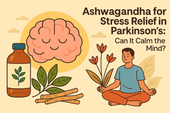
Ashwagandha for Stress Relief in Parkinson’s: Can It Calm the Mind?
Ashwagandha, the ancient Ayurvedic adaptogen, may offer powerful stress relief for people with Parkinson’s. 🌿 By regulating cortisol, calming the nervous system, and supporting dopamine balance, this natural herb helps ease anxiety, improve sleep, and promote emotional stability — restoring calm from the inside out. 🌙
-
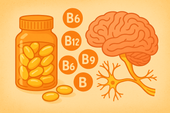
B Vitamins for Mood and Nerve Health in Parkinson’s Patients
B vitamins play a vital role in protecting the brain and nervous system in Parkinson’s. 🌿 From supporting dopamine production to reducing homocysteine and improving mood, these essential nutrients — especially B6, B9, and B12 — help stabilize emotions, boost energy, and preserve nerve integrity for better daily function and mental clarity. 💫
-
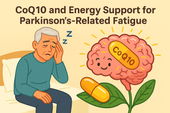
CoQ10 and Energy Support for Parkinson’s-Related Fatigue
Fatigue in Parkinson’s goes far beyond tiredness — it’s a deep cellular exhaustion. ⚡ CoQ10, a natural compound essential for energy production, may help restore vitality by supporting mitochondrial function and protecting brain cells from oxidative stress. Discover how CoQ10 can enhance energy, reduce fatigue, and improve overall resilience in Parkinson’s. 🌿
-
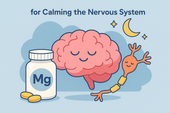
Magnesium for Calming the Nervous System in Parkinson’s
Magnesium is one of the most underrated allies for people with Parkinson’s. 🌿 This calming mineral supports the brain, relaxes tense muscles, and stabilizes the nervous system, helping reduce anxiety, restlessness, and sleep problems. Discover how magnesium nourishes dopamine pathways, protects neurons, and restores a sense of inner peace from within. 💫
-
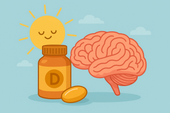
Vitamin D and Mental Health in Parkinson’s: Why Deficiency Matters
Vitamin D is more than a sunshine nutrient — it’s a key player in brain health and emotional balance for people with Parkinson’s. 🌞 This article explores how vitamin D influences dopamine, serotonin, and inflammation, and why deficiency can worsen depression, anxiety, and cognitive decline. Discover how restoring healthy levels can bring clarity, calm, and resilience back to daily life. 🌿
-

Omega-3s and Parkinson’s: Supporting Mood and Cognitive Clarity
Omega-3 fatty acids are among the most powerful nutrients for supporting brain health and emotional well-being in people with Parkinson’s. 🧠 This article explores how omega-3s strengthen neuronal membranes, improve dopamine and serotonin signaling, reduce inflammation, and promote cognitive clarity. Learn how these essential fats can help ease anxiety, lift mood, and protect your mind from oxidative stress naturally. 🌿
-
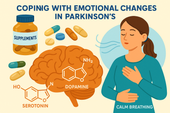
Coping with Emotional Changes in Parkinson’s: Supplements That Support Balance
Emotional changes like anxiety, depression, and irritability are common yet often overlooked symptoms of Parkinson’s disease. This article explores how supplements such as omega-3s, magnesium, and vitamin D can support mood regulation, while therapy and breathwork techniques help restore calm and emotional balance naturally. 🌿
-
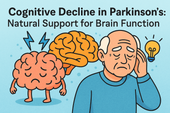
Cognitive Decline in Parkinson’s: Natural Support for Brain Function
Cognitive decline in Parkinson’s can affect memory, focus, and daily independence—but there’s hope. Understanding how the disease impacts brain chemistry opens the door to natural ways of support. From omega-3s and CoQ10 to mindfulness and exercise, you can nourish your brain, boost clarity, and slow decline through holistic care. 🌿🧠
-
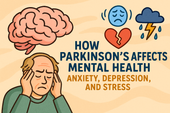
How Parkinson’s Affects Mental Health: Anxiety, Depression, and Stress
Dopamine is the brain’s spark of motivation—the chemical that fuels focus, pleasure, and drive. When dopamine levels are balanced, you feel inspired and alive; when they’re low, everything feels like an uphill climb. Understanding how dopamine works can help you support mental clarity, resilience, and emotional balance naturally. ⚡🧠
-

How Supplements Can Support Therapy and Healing from Co-Dependency
Biology is the science of life—an exploration of how cells, systems, and molecules create the foundation for every thought, emotion, and heartbeat. From the way our DNA shapes us to how hormones and neurons communicate, biology reveals the deep interconnectedness between mind and body. Understanding it helps us appreciate the delicate balance that keeps us alive, aware, and evolving. 🌿🧬
-
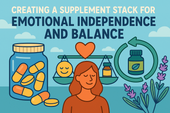
Creating a Supplement Stack for Emotional Independence and Balance
Biochemistry is the invisible language of life—how molecules, cells, and systems communicate to keep your body and mind in balance. From neurotransmitters shaping emotions to enzymes fueling energy, every process in your body reflects biochemical harmony. Understanding these reactions helps you see how nutrition, supplements, and emotions intertwine to support health, mood, and resilience. ⚗️🌿
-
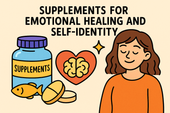
Supplements for Supporting Emotional Healing and Self-Identity
Biology is the bridge between mind and body—the science that explains how cells, hormones, and systems communicate to sustain life. It reveals how emotional states influence physical health, and how nourishment, rest, and movement keep us in balance. Understanding biology helps us reconnect with our natural intelligence and live in harmony with ourselves and the world. 🌿🔬
-
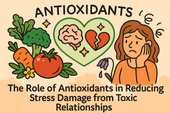
The Role of Antioxidants in Reducing Stress Damage from Toxic Relationships
Biology is the study of life in motion—the intricate dance between cells, systems, and the natural world. From DNA replication to neurotransmitter flow, every process in the human body reflects the intelligence of life adapting and evolving. Understanding this harmony helps us appreciate how nutrition, stress, and environment shape our health and emotional balance. 🌿🔬
-
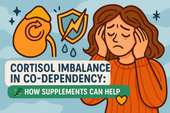
Cortisol Imbalance in Co-Dependency: How Supplements Can Help
Cortisol is the body’s main stress hormone—essential for energy and focus, yet harmful when chronically elevated. When life feels like constant pressure, cortisol imbalance can trigger fatigue, anxiety, and mood swings. Learning how to restore balance through rest, nutrition, and the right supplements can help you rebuild calm, clarity, and resilience from the inside out. 🌿💫
-
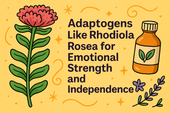
Adaptogens Like Rhodiola Rosea for Emotional Strength and Independence
Adaptogens are nature’s stress-balancing herbs—plants like Rhodiola, Ashwagandha, and Holy Basil that help your body adapt to emotional and physical pressure. They don’t numb or overstimulate; they teach your system how to find calm and stability again. By restoring balance to your hormones, energy, and mood, adaptogens nurture emotional resilience and grounded strength. 🌿✨
-
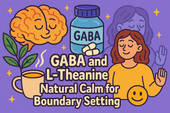
GABA and L-Theanine: Natural Calm for Boundary Setting
Anxiety can feel like a storm inside your mind—constant tension, overthinking, and the inability to relax even when you’re safe. But beneath the chaos, your body is simply trying to protect you. Learning to calm anxiety starts with understanding how your brain and nervous system respond to stress—and how to gently guide them back to peace. 🌿💫
-
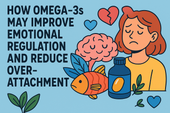
How Omega-3s May Improve Emotional Regulation and Reduce Over-Attachment
Inflammation isn’t just about sore joints or fatigue—it’s also a hidden driver of mood swings, anxiety, and emotional burnout. When chronic stress or poor diet keep the body inflamed, the brain’s chemistry changes, making calm harder to access. Learning how to reduce inflammation through nutrition, rest, and mindful living helps restore balance from the inside out. 🌿💫
-

Magnesium for Calming the Nervous System in Co-Dependent Relationships
The nervous system is the body’s communication network, linking your mind and organs through a delicate web of electrical signals. It controls everything from emotional responses to muscle movement—and when it’s overwhelmed by chronic stress or anxiety, balance is lost. Learning how to calm and nourish your nervous system through nutrition, mindfulness, and rest can restore peace and emotional stability. 🌿💫
-

Ashwagandha and Co-Dependency: Supporting Stress Resilience
Stress is more than a feeling—it’s a full-body signal that your system is overwhelmed. When the mind races and the body tenses, your hormones, breathing, and focus all shift into survival mode. Chronic stress doesn’t just affect emotions—it reshapes your nervous system, drains your energy, and clouds your clarity. Learning to understand and manage stress gently is the first step toward peace, balance, and true recovery. 🌿💫
-

Why Co-Dependency Feels Draining: Adrenal Fatigue and Supplements That Help
The adrenal glands are small but powerful organs that sit above your kidneys, acting as your body’s built-in stress managers. They produce hormones like cortisol and adrenaline that help regulate energy, mood, and resilience. When they’re overworked from chronic stress or emotional exhaustion, fatigue and imbalance follow. Supporting adrenal health naturally can help restore calm, energy, and hormonal balance. 🌿⚡
-

The Link Between Anxiety, Co-Dependency, and Natural Support
Anxiety feels like living in constant alert mode—your heart races, your thoughts loop, and your body can’t find peace. It’s the nervous system’s way of preparing for danger, even when none exists. Understanding what’s happening in your mind and body is the first step toward calming the storm and restoring balance. 🌿💫
-

Supplements That Support Dopamine and Serotonin in Co-Dependent Patterns
Serotonin is the neurotransmitter of calm, confidence, and contentment. When it’s balanced, you feel peaceful and emotionally grounded. When it’s low, anxiety, mood swings, and emotional dependence take over. By understanding serotonin’s role in emotional health—and how to support it naturally—you can rebuild inner stability, improve relationships, and cultivate lasting happiness from within. 🌞💫
-

How Emotional Exhaustion in Codependency Impacts the Nervous System
The nervous system is the body’s communication network, connecting the brain to every organ and muscle. It regulates stress, mood, and emotion through a delicate balance of electrical and chemical signals. When overwhelmed, it can become dysregulated—leading to fatigue, anxiety, and emotional imbalance. Understanding how to calm and strengthen the nervous system is key to healing from chronic stress and emotional burnout. ⚡🌿
-

What Is Co-Dependency? The Role of Brain Chemistry and Stress
Stress is more than a feeling—it’s a full-body experience that begins in the brain and ripples through every cell. When cortisol surges and the nervous system stays on alert, your body can’t rest or recover. Over time, this constant tension affects energy, focus, mood, and even immune health. Understanding stress chemistry is the first step toward breaking free from burnout and finding calm again. 🌿
-

Creating a Supplement Stack for Motivation, Energy, and Anti-Procrastination
Motivation is the fuel behind every meaningful achievement—but it’s not just about willpower. It’s a mix of mindset, brain chemistry, and momentum. When energy, focus, and purpose align, action feels natural instead of forced. Learn how to harness motivation as a daily state, not a fleeting feeling.
-

Supplements for Building Consistency and Reducing Chronic Procrastination
Biochemistry is the bridge between biology and chemistry—the science of life at the molecular level. It explains how nutrients, hormones, and neurotransmitters interact to create energy, thought, and emotion. From brain function to muscle movement, biochemistry reveals the invisible processes that sustain health, balance, and vitality.
-

GABA and Procrastination: Supporting Calm Focus for Productivity
GABA is the brain’s natural calming messenger—a neurotransmitter that helps slow mental overactivity and ease stress. When GABA levels drop, focus fades, anxiety rises, and procrastination becomes more likely. By supporting GABA through nutrition, lifestyle, and supplements, you can restore calm clarity, improve focus, and take action with steady, balanced energy.
-

Ashwagandha and Procrastination: Lowering Stress to Improve Action
Science is the language of curiosity and discovery. It helps us understand the hidden patterns behind life, energy, and the universe. Through experimentation and critical thinking, science connects imagination to evidence—turning questions into knowledge. Whether through microscopes, molecules, or minds at work, science represents our endless pursuit of truth and innovation.
-

Neurotransmitters and Motivation: Supplements That Support Drive and Focus
Supplements can do more than boost physical health—they can also enhance mental clarity, focus, and motivation. Nutrients like omega-3s, magnesium, B vitamins, and adaptogens help balance neurotransmitters, stabilize mood, and support brain energy. When combined with good sleep, nutrition, and mindful habits, they can transform how your brain performs under stress.
-

How Stress Hormones Like Cortisol Fuel Procrastination (and What Helps)
Blood sugar isn’t just about physical health—it directly impacts focus, mood, and motivation. When glucose levels spike and crash, energy and attention do the same, fueling procrastination and brain fog. Learning how to stabilize blood sugar through balanced meals, mindful habits, and key nutrients helps keep your mind steady, focused, and ready to act.
-

Brain Fog and Procrastination: Supplements for Mental Clarity
Brain fog can turn even simple tasks into mental hurdles. When your thoughts feel slow and unclear, procrastination often follows—making focus and productivity seem impossible. This article explores the biochemical and lifestyle causes of brain fog and reveals the most effective supplements for restoring mental clarity, focus, and sustained energy.
-

The Link Between Low Energy and Procrastination: Can Supplements Help?
Neurochemistry shapes how we think, feel, and act. When neurotransmitters like dopamine, serotonin, and GABA fall out of balance, it can lead to fatigue, anxiety, or lack of motivation—fueling procrastination and low mood. Understanding the brain’s chemical communication system helps us find ways to restore focus, calm, and emotional stability through nutrition, mindfulness, and targeted supplements.
-

Why Do We Procrastinate? The Role of Dopamine and Supplements That Support It
Dopamine is the brain’s motivation messenger—the chemical that fuels focus, reward, and drive. When dopamine levels drop, even simple tasks can feel impossible to start. This article explores how dopamine shapes procrastination, motivation, and mental energy, along with natural supplements and daily habits that help restore balance and get things done.
-

Phosphatidylserine and Stress Reduction for People with BDD
Stress is more than a mental state—it’s a full-body experience that affects hormones, brain chemistry, and emotional balance. For people with Body Dysmorphic Disorder (BDD), constant tension and worry about appearance can overload the nervous system. Learning how stress works and finding ways to calm it is key to breaking the cycle of anxiety and self-criticism.
-

How Antioxidants Like Vitamin C & E Support Mental Health in BDD
Antioxidants are the body’s natural defense against stress and inflammation. For people with Body Dysmorphic Disorder (BDD), oxidative stress can worsen fatigue, anxiety, and emotional imbalance. Nutrients like Vitamin C and E help protect brain cells, boost neurotransmitter function, and support a calmer, clearer mindset—building a stronger foundation for recovery.
-

Ginkgo Biloba and Memory Support for BDD Recovery
Emotional regulation is the foundation of healing from Body Dysmorphic Disorder (BDD). When the nervous system stays in constant overdrive, even small stressors can trigger self-critical spirals. Learning to calm emotional reactivity helps restore clarity, confidence, and a sense of inner balance. By blending mindfulness, nervous system support, and self-compassion, you can retrain your brain to respond—not react—to emotion.
-

Alpha GPC and Cognitive Function in Body Dysmorphic Disorder
Mental fatigue can feel like your brain has hit a wall—thoughts slow down, focus fades, and motivation disappears. For people with Body Dysmorphic Disorder (BDD), chronic overthinking, emotional stress, and constant self-evaluation can deplete mental energy even further. Understanding what causes this cognitive exhaustion is the first step toward recovery—through rest, balanced nutrition, and targeted brain-supporting supplements.
-

N-Acetyl L-Tyrosine and BDD: Supporting Mental Clarity
Chronic stress doesn’t just affect your mood—it reshapes your brain chemistry, weakens focus, and fuels the obsessive thought loops common in Body Dysmorphic Disorder (BDD). Over time, constant cortisol elevation drains mental energy and emotional balance. Learning to recognize and manage chronic stress is essential to restoring mental clarity, self-compassion, and resilience.
-

Chamomile and Lavender for Calming Obsessive Body Image Thoughts
The nervous system is the command center of our emotional and physical world—and in Body Dysmorphic Disorder (BDD), it often operates in overdrive. Understanding how the brain and body communicate under stress reveals why intrusive thoughts feel uncontrollable. Learning to regulate the nervous system through calm practices, nutrition, and supplements helps restore inner balance and emotional safety.
-

Adaptogens for Body Dysmorphic Disorder: Rhodiola, Ginseng, and More
Rhodiola rosea, often called the “golden root,” is an adaptogenic herb renowned for boosting stress resilience and mental endurance. For individuals with Body Dysmorphic Disorder (BDD), Rhodiola may help reduce fatigue, regulate cortisol, and enhance emotional balance. By supporting both mind and body, this powerful plant promotes calm focus, improved mood, and renewed energy to face daily challenges.
-

B Vitamins for Stress Resilience in BDD: Rebuilding Calm from Within
Biochemistry is at the heart of every thought, emotion, and reaction we experience. In Body Dysmorphic Disorder (BDD), chemical imbalances in neurotransmitters like serotonin, dopamine, and GABA can amplify stress and distort self-perception. Understanding the biochemistry behind mood and stress regulation offers a path toward healing—bridging the gap between emotional experience and the body’s molecular balance.
-

Melatonin and Body Dysmorphic Disorder: Restoring Healthy Sleep Patterns
Melatonin, the body’s natural sleep hormone, plays a vital role in helping people with Body Dysmorphic Disorder (BDD) restore healthy sleep cycles. When anxiety and obsessive thinking interfere with rest, melatonin levels often drop, leading to more emotional reactivity and distorted self-perception. This article explores how melatonin works, why BDD disrupts it, and how natural supplementation—combined with mindful routines—can help the brain and body finally find calm at night.
-

Sleep Struggles with BDD: Supplements for Rest and Recovery
When you’re living with Body Dysmorphic Disorder (BDD), restful sleep can feel impossible—but the right supplements can help reset your body’s natural rhythm. From magnesium and L-theanine to 5-HTP and ashwagandha, these nutrients support relaxation, lower cortisol, and enhance melatonin production. This article explores how supplements can calm the mind, ease nighttime anxiety, and promote true restorative sleep for emotional and physical recovery.
-

5-HTP and Serotonin Balance: Could It Help with Body Dysmorphic Disorder?
Anxiety can feel like a storm inside the mind—restless, overwhelming, and hard to control. In people with Body Dysmorphic Disorder (BDD), anxiety often fuels obsessive thoughts and self-criticism, creating a painful cycle of worry and self-doubt. This article explores the biological roots of anxiety, the role of neurotransmitters like serotonin and GABA, and how natural strategies such as mindfulness, supplements, and nervous system regulation can restore calm and mental clarity.
-

Can Ashwagandha Help Ease Stress and Anxiety in Body Dysmorphic Disorder?
Neurotransmitters like serotonin, dopamine, GABA, and acetylcholine are the chemical messengers that shape how we think, feel, and react to stress. In Body Dysmorphic Disorder (BDD), imbalances in these neurotransmitters can amplify anxiety, obsessive thinking, and emotional distress. This article explores how restoring healthy brain chemistry through nutrition, supplements, and mindfulness can help bring clarity, calm, and emotional stability.
-

L-Theanine for BDD: Finding Calm in the Mind
Neurochemistry plays a central role in how we think, feel, and see ourselves. For those living with Body Dysmorphic Disorder (BDD), imbalances in neurotransmitters like serotonin, dopamine, and GABA can intensify anxiety, obsessive thoughts, and emotional distress. This article explores how regulating brain chemistry through supplements, mindfulness, and lifestyle changes can bring the nervous system back into harmony and restore inner calm.
-

Omega-3 Fatty Acids and Body Image Disorders: Supporting Emotional Health
Omega-3 fatty acids do far more than support heart health—they nourish the brain, stabilize mood, and may ease the emotional turbulence tied to body image disorders like BDD. This in-depth article explores how omega-3s regulate serotonin, dopamine, and inflammation, helping individuals reduce obsessive thoughts and rebuild self-acceptance. It also connects nutrition to therapy, mindfulness, and nervous system balance for holistic emotional healing.
-

Magnesium and BDD: Calming an Overactive Nervous System
Magnesium plays a crucial role in calming an overactive nervous system—something people with Body Dysmorphic Disorder (BDD) struggle with daily. This article explores how magnesium supports relaxation, emotional regulation, and stress reduction while diving into the science behind its connection to brain chemistry. It also examines how combining magnesium supplementation with therapy and breathwork can help rebalance the body’s stress response, reduce obsessive thought patterns, and promote lasting nervous system calm.
-

The Gut-Brain Axis and BDD: Why Probiotics Might Matter
The gut and brain are constantly in conversation — and that dialogue may shape how you experience Body Dysmorphic Disorder. By nurturing your microbiome with probiotics, prebiotics, and gut-healing nutrients, you can help rebalance serotonin, calm anxiety, and restore emotional stability from within 🧠🦠.

















































